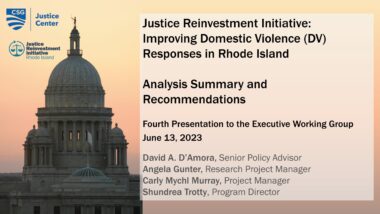
Executive Working Group Meets to Discuss Community Intervention and Correctional Responses to Domestic Violence in Rhode Island
On June 13, 2023, CSG Justice Center staff concluded their analysis of domestic violence responses in Rhode Island and presented recommendations to the Domestic Violence Executive Working Group. Recommendations were based on the analysis of data collected between June 2022 and June 2023.
The analysis, supported by the Rhode Island Department of Corrections, used Sequential Intercept Mapping to study responses to domestic violence. Sequential Intercept Mapping of Rhode Island’s domestic violence responses, adapted from the Sequential Intercept Model, allowed CSG Justice Center staff to assess what programs, supports, barriers, and gaps exist for victims and survivors as well as individuals who have committed domestic violence at various points, or intercepts, in the system. The five intercepts analyzed in this assessment were community services, law enforcement, initial detention and court hearings, systems responses, and reentry and community supervision.
The recommendations presented at the meeting were informed by interviews, surveys, and focus groups with over 230 individuals across these intercepts and analyses of over 96,000 case files from the Rhode Island Coalition Against Domestic Violence, Domestic Violence and Sexual Assault Training and Monitoring Unit, the judiciary, and Department of Corrections. The CSG Justice Center recommended that Rhode Island do the following:
- Use comprehensive, evidence-informed domestic violence education, training, approaches, and policies across community, behavioral health, human service, and criminal justice systems to create more consistent responses for victims and survivors, as well as individuals who commit domestic violence.
- Improve how domestic violence data is collected, reported, and used to increase understanding of domestic violence prevalence, characteristics, and responses across the state.
- Invest sufficient and sustained resources to ensure that all domestic violence victims and survivors are supported. Also, work to ensure that programs for people who commit domestic violence are delivered in ways that anticipate and address common barriers to program success, such as poverty, unstable housing, substance use, mental health, geographic isolation, and other challenges.
- Increase the availability, accessibility, and responsivity of programming for victims and survivors, as well as individuals who have committed violence, accounting for differences in language, physical ability, geography, gender and sexual identity, race and ethnicity, socioeconomic factors, and other considerations.
- Create shared parameters for partnerships among community, behavioral health, human service, and criminal justice agencies, including defining partners’ roles and responsibilities and information sharing to create more streamlined services and eliminate gaps or duplication in service provision for victims and survivors and people who have committed domestic violence.
- Make statutory changes to better support victims and survivors and increase resources for accountability, including modifications to Batterers Intervention Programming, for people who have committed domestic violence.
The Executive Working Group will meet in July 2023 to discuss recommendations in more depth and vote on which ones to move forward for approval by the governor.
This project was supported by Grant No. 2020-ZB-BX-0022 awarded by the Bureau of Justice Assistance. The Bureau of Justice Assistance is a component of the Department of Justice’s Office of Justice Programs, which also includes the Bureau of Justice Statistics, the National Institute of Justice, the Office of Juvenile Justice and Delinquency Prevention, the Office for Victims of Crime, and the SMART Office. Points of view or opinions in this document are those of the author and do not necessarily represent the official position or policies of the U.S. Department of Justice.
In response to growing calls for police reform in New Jersey, particularly following the shootings of Najee Seabrooks…
Read More Three Things to Know About New Jersey’s Groundbreaking Community Response Legislation
Three Things to Know About New Jersey’s Groundbreaking Community Response Legislation
In response to growing calls for police reform in New Jersey, particularly following the shootings of Najee Seabrooks and Andrew Washington in March and August 2023, a coalition of law enforcement officials, mental health professionals, and community advocates partnered to explore public safety response alternatives.
Read More Apply Now: Join a Learning Community for Community and Crisis Response Teams to Improve Responses to Youth
Read More
Apply Now: Join a Learning Community for Community and Crisis Response Teams to Improve Responses to Youth
Read More
 Apply Now: Join a Learning Community Focused on Substance Use and Overdose Community Response Programs
Read More
Apply Now: Join a Learning Community Focused on Substance Use and Overdose Community Response Programs
Read More















